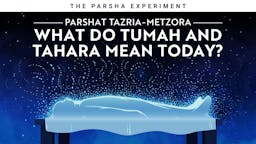Dvar Torah Parshat Naso
Why interrupt a great story with a bunch of laws?
By Adina Blaustein | 13 March 2024 | 5 Minute Read
The book of Numbers opens with a teaser for something exciting to come. The opening parsha, Parshat Bamidbar, tells us about the census that tallied the number of Israelites fit for army service. Additionally, we are told about the organization of the Israelites when they camped and traveled. These two details build up the expectation that what follows will be a description of the Israelite’s final and most exciting journey straight to the land of Israel.
This moment has been a long time coming. The Israelites camped around Har Sinai after receiving the Torah for about a year, all throughout the second half of Exodus and Leviticus.
And God kept promising to our forefathers that he would bring their descendants to the land. So when we conclude Parshat Bamidbar, expectations are high that finally all of the preludes and preparations are complete, and the Israelites can continue with the most important journey of their lives.
But that’s not what happens! Instead of moving on to describe the journey to the land of Israel, Parshat Naso includes laws that just seem unrelated and random. We are taught laws related to keeping the camp free from tumah (ritual impurity). We learn the laws of a thief, and how he must repay the victim from whom he stole. We learn about a sotah, a woman accused by her husband of marital infidelity. And we learn about the nazir, one who must abstain from wine and haircuts when he pledges himself to God.
Tumah, stealing, sotah, and nazir...these are so random. What do any of these laws have to do with each other? Why is the Torah bringing these up together? And why now of all places, when the exciting journey to the land of Israel would seem to be far more important to discuss?
By looking more closely at the laws we can identify some meaning that might help us understand why these laws are not random but have a unifying theme. And we’ll see why these laws are important for us to learn about at this very moment, in the book of Numbers, before the Israelites begin their journey.
Connecting Themes Between the Book of Numbers and Leviticus
When you start reviewing the laws taught in Parshat Naso, you start noticing something interesting. These laws related to tumah, paying restitution for stolen goods, the sotah, and nazir at first glance seemed unrelated to each other - like a hodgepodge of miscellaneous commandments. But in fact, these laws aren’t completely unrelated. They actually all share something in common. What these four laws from Parshat Naso all have in common is that they all appear in some way, shape, or form in the book of Leviticus. Let’s go through these four laws and identify the connections:
- Tumah: Let's start with the laws of tumah, ritual impurity. In Parshat Naso, God commands that anyone with a bodily discharge, tzaraat (a ritual skin impurity) or anyone who becomes impure from a corpse should be sent out from the camp. Back in Leviticus, God said to Moses that Israel should be careful regarding the laws of tumah, using very similar language: “so that they don't perish by making my Mishkan – which is among you – tamei” (Leviticus 15:31). It’s basically the same law, taught again.
- Theft: The second law relates to restitution for stolen goods. God tells Moses what happens if one sins by stealing or dealing falsely with someone, he must pay back the same amount he stole plus a fine of 1/5th to the person he wronged. And if he can't find the person he harmed, then the restitution should be given to God for the priest. And this law as well is also identical to Leviticus: “...restore either that which was gotten through robbery…that person shall repay the principal amount and add a fifth part to it” (Leviticus 5:23-24).
- Sotah: And now, let's look at the next case in Naso – that of the Sotah, the potentially adulterous woman. The verses open with: אִישׁ אִישׁ כִּי-תִשְׂטֶה אִשְׁתּוֹ, וּמָעֲלָה בוֹ מָעַל, if one's wife has gone astray and has betrayed him, and it continues with a long system of laws and rituals in the Mishkan, where the couple goes to resolve their case. At first glance, this law seems new. But while we’ve never seen the exact case of a woman accused of adultery elsewhere in the Torah, the words used to describe the case “מעל - ma’al” are quite familiar from Leviticus. In Leviticus, that word is used in a few places, to describe something very specific – when people sin by misusing objects that had been designated to God or the Mishkan. So even though the exact laws aren’t lifted from Leviticus, the language used is pointing us back to Leviticus.
- Nazir: And now we move to the last law in Naso, that of the Nazir, one who chooses to pledge himself to God, by following special restrictions. The Nazir is also a new law, but the restrictions that the Nazir must abide by for the term of his pledge are quite familiar from Leviticus. Firstly, the Nazir must abstain from alcohol. Secondly, he may not become ritually impure by coming in contact with a dead body. These prohibitions are quite familiar as well from the book of Leviticus, where God tells the priests these exact laws!
What Do These Repetitious Themes in Numbers Mean?
In this video, Rabbi David Block analyzes these laws in Parshat Naso and demonstrates that these laws aren’t miscellaneous, they're all tied together by their connections to Leviticus. But if anything, we now have a new question, which is even stranger – why do all of these laws hark back to Leviticus? Rabbi Block shows that the answer to these questions is embedded in the fascinating laws of the Nazir, a regular person who chooses to separate and dedicate himself to God. The Nazir holds the clue to understanding not just the thread tying these laws together, but why they are deeply relevant for this stage of the story in the Book of Numbers, to frame the journey ahead.
More Parshat Naso Videos

What Are The Unique Laws Of Sotah Really About?
Video • 34 min
Parshat Naso introduces us to one of the oddest laws in the Torah, the laws of the Sotah -- a woman suspected of adultery by her husband. If the woman chooses to defend her honor, she is able to partake in an ancient ritual where the Kohen makes her drink tampered water. If she’s telling the truth, nothing happens and she’s rewarded with children. But if she’s lying, she has a traumatic reaction to the water and she’s killed. What is the basis for this strange law and where did the procedure originate? Join Rabbi Fohrman and Rivky as they re-examine this practice and discover a unique relationship to the story of Noah earlier in the Torah — and never think about the laws of the Sotah the same way again.

What Do Tumah And Tahara Mean Today?
Video series • Part 1 of 2 • 11 min
In Parshat Tazria, we are introduced to the concepts of Tumah and Tahara. Some translate them as cleanliness and uncleanliness, some say ritual purity and impurity, but we never seem to get a clear and relevant understanding of what they actually are. Join us in Part I of this quest as we begin to tackle both what Tumah and Tahara are, and how these new definitions can truly impact our lives today.

Why Would Anyone Want to Be a Nazir?
Video series • Part 1 of 2 • 16 min
No haircuts, wine, or contact with the dead. Who would want to take on this optional oath? Find out how these unique restrictions might offer access to a coveted level of connection that most cannot normally attain.
More Parshat Naso Guides
Naso: Letting Our Children Go
Printable Guide
A printable parsha guide for our Naso video, "Letting Our Children Go."
Naso: What Does The Torah Teach About Parenting?
Printable Guide
A printable parsha guide for our Naso video, "What Does The Torah Teach About Parenting?"
Why Become A Nazir?
Printable Guide
A Teacher’s lesson plan and worksheet for: Why Become A Nazir?
Parshat Naso Pages
What is Aleph Beta?
Aleph Beta is a unique kind of Torah library. Led by our founder, Rabbi David Fohrman, we are dedicated to high-level, textual Torah learning for adults that is intellectually and spiritually sophisticated, that enlivens your Jewish practice and helps you forge a deeper connection to God. Whether you’ve been learning in yeshiva for years or you’re just beginning your Torah journey, you’re sure to find something meaningful and surprising waiting for you here.
Browse our library of over 1,000 beautifully produced animated videos, podcasts, deep dive courses, and printable guides. Topics include the weekly parsha, Jewish holidays & fast days, laws & mitzvot, prayers, relationships, big philosophical ideas and more. Have something to say at the Shabbos table that will amaze your family and guests and bring deep meaning into their lives.


